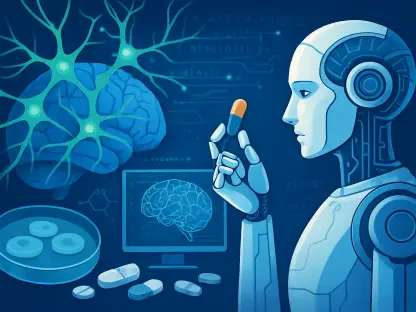In a world where gastrointestinal (GI) cancers continue to pose a formidable challenge to global health, a groundbreaking study from researchers at Weill Cornell Medicine-Qatar has unveiled a potential game-changer in cancer therapy. GI cancers, encompassing colorectal, stomach, liver, esophageal, and pancreatic cancers, account for roughly a quarter of all cancer cases worldwide and stand as the third leading cause of cancer-related deaths. The alarming trend of early-onset cases among individuals under 50, combined with persistent issues like treatment resistance and tumor spread, highlights an urgent need for innovative solutions. This research spotlights flavonoids—natural compounds found in plants—as a promising tool to induce ferroptosis, a unique form of programmed cell death, offering hope for more effective strategies against these devastating diseases. The findings suggest a shift in how cancer treatment could evolve, blending natural agents with cutting-edge science to address unmet medical needs.
Unveiling Ferroptosis as a Therapeutic Target
A pivotal aspect of this research centers on ferroptosis, an iron-dependent form of cell death driven by the buildup of lipid peroxides, which presents a novel avenue for combating GI cancers. Unlike conventional treatments such as surgery, chemotherapy, or immunotherapy, which often struggle against cancer cells’ ability to adapt and resist, ferroptosis operates through a distinct mechanism that could bypass these barriers. Preclinical studies, involving both cell cultures and animal models, have demonstrated that triggering this process can effectively kill cancer cells. The potential to target this pathway offers a fresh perspective on treatment, particularly for patients with limited options due to advanced disease stages or resistance to standard therapies. By focusing on this unique cell death process, researchers aim to develop interventions that could redefine outcomes for those battling aggressive GI cancers, paving the way for more resilient therapeutic approaches.
The role of flavonoids in inducing ferroptosis adds another layer of intrigue to this scientific advancement. Known primarily for their antioxidant properties, these natural compounds are now being recognized for their ability to act as direct anticancer agents and as sensitizers that amplify the impact of existing treatments. The evidence suggests that flavonoids can disrupt cancer cell survival by promoting lipid peroxidation, a key driver of ferroptosis, while also enhancing the efficacy of drugs that might otherwise fail due to resistance. This dual functionality positions flavonoids as versatile tools in the fight against GI cancers, potentially reducing the reliance on harsher treatments with severe side effects. As research progresses, the integration of such natural agents into clinical protocols could offer a more balanced and effective strategy, addressing both the immediate need to kill cancer cells and the long-term goal of sustaining patient health.
Addressing the Global Burden of GI Cancers
GI cancers represent a significant public health challenge, influenced by a complex interplay of genetic, environmental, and lifestyle factors such as obesity, smoking, and excessive alcohol consumption. While only about 10% of these cancers are hereditary, the majority arise sporadically, with incidence and mortality rates varying widely across the globe due to differences in risk factor prevalence and access to care. Colorectal cancer, in particular, stands out as the most common among GI cancers, underscoring the need for targeted interventions in this area. The rise of early-onset cases further complicates the landscape, as younger patients often face unique diagnostic and treatment challenges. Understanding these epidemiological trends is crucial for developing therapies that can address the diverse needs of affected populations, ensuring that innovations like ferroptosis-based treatments are tailored to the realities of global cancer care.
Beyond epidemiology, the limitations of current therapies highlight the urgency of exploring alternatives like flavonoid-mediated ferroptosis. Conventional approaches often fall short when faced with issues like metastasis, angiogenesis, and drug resistance, leaving many patients with few viable options. The preclinical success of flavonoids in triggering cell death pathways offers a glimmer of hope, suggesting that natural compounds could fill critical gaps in treatment protocols. By acting both independently and in synergy with existing drugs, these agents might help overcome barriers that have long hindered progress in GI cancer management. As researchers push to translate these findings into clinical applications, the focus remains on creating personalized strategies that account for individual patient profiles and the broader challenges of cancer care, potentially transforming the therapeutic landscape for years to come.
Charting the Path Forward with Innovative Therapies
Reflecting on the journey of this research, the study provided compelling evidence that flavonoid-induced ferroptosis holds transformative potential for GI cancer treatment. The ability to target a distinct cell death pathway offered a powerful countermeasure to the shortcomings of traditional therapies, sparking optimism among the scientific community. The dual role of flavonoids as both standalone agents and enhancers of existing drugs stood out as a remarkable achievement, addressing critical hurdles like tumor progression and resistance. Supported by robust preclinical data, this approach captured the imagination of those seeking to improve patient outcomes in the face of a daunting global health crisis, marking a significant milestone in the evolution of cancer care.
Looking ahead, the next steps involve bridging the gap between preclinical promise and clinical reality through rigorous testing and the integration of advanced technologies. Collaborative efforts among researchers, clinicians, and institutions will be essential to refine these therapies and ensure their safety and efficacy in diverse patient populations. Exploring how flavonoids can be incorporated into tailored treatment plans opens up exciting possibilities for personalized medicine, while continued investment in research could unlock further insights into ferroptosis mechanisms. As the fight against GI cancers presses on, this innovative strategy serves as a beacon of progress, urging the medical field to embrace natural compounds and novel pathways in the quest for lasting solutions to one of humanity’s most persistent challenges.









